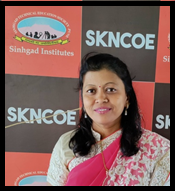

HOD's Desk

“Sa Vidya Ya Vimuktaye” Education is that which liberates.
The Department of Electronics and Telecommunication Engineering (E & TC) was established in the year 2001 with an intake of 60 students in undergraduate engineering course which eventually has increased. Present intake for the UG programme is 300 students.
The E&TC Department in SKNCOE strives hard to provide a very good learning experience to its students. The strength of the Department continues excellence in teaching as well as progressing in Research and Development activities. The Department has developed the state-of-art infrastructure, well equipped laboratories, Departmental library, classrooms with modern teaching aids. These facilities create conducive environment for teaching-learning process and act as catalyst for quality technical education.
The faculty of the E&TC Department is well qualified, and motivated with a strong commitment to teaching and research. They continuously upgrade themselves to keep pace with rapidly changing technology. The faculty is actively participating in various conferences, workshops, seminars, training programs at National and International level. Faculty is also involved in research and presenting papers at various National and International Conferences, which are further published in Reputed Journals. BCUD Pune has funded the research proposals filed by the departmental faculty.
The tradition of Excellence in Results in the University of Pune Examinations is continued. Sincere and dedicated efforts of our students and faculties have transformed excellent results with University toppers. Apart from academic excellence, the Department also encourages students to take part in various co-curricular activities such as technical seminars, paper presentations, project competitions, Robocon at prestigious venues such as IIT, NIT, IETE etc as well as in prestigious cultural events like Sinhgad Karandak, Purshottam Karandak, Firodia Karandak, Suman Karandak and many sports events. The Department provides a platform for students to develop organizational skills and to upgrade their technical competence.
The Department has also active ISF (IETE Students Forum), ELESA (Electronics Students Association) which helps in organizing various guest lectures, seminars, workshops and conferences for the students and the faculty members in and around the Maharashtra. To improve employability skills of students under Student Training Program (STP) various trainings and activities such as soft skills, communication skills, technical fundamentals, research methodology, aptitude training, interview preparation and value addition program are conducted. Also to enhance programming skills of students IIT spoken tutorials are conducted.
The Department has also signed MOU with the Qualitat Sysyems Pvt. Ltd. Pune, M/s.EcoRise Software Solutions, Pune, Geekslab TechnologiesPvt. Ltd. Noida, Jetking Hadapsar Learning Center, Pune, Electronics Study Centre, Nashik, Regional Telecom Training Centre Bharat Sanchar Nigam Ltd. Pune, Automate Engineering Pvt. Ltd.Pune, Champion Semiconductor LLP, Uttar Pradesh, Trident Techlabs University Programme Partner of Texas Instrument, Pune, Foundation for Innovation and Collaborative Education, Banglore, Geekslab Technologies Pvt. Ltd., New Delhi, Secure Era Pvt. Limited, Pune, GB Softronics & Bentork Industries LLP, Pune, CADCAM Guru solutions Pvt. Ltd. Pune etc which helps students and the faculty members to carry out the research and development activities in the Department.
Preplacement Orientation and Workshops on preparation for Aptitude Tests and Group Discussion (GD) and Personal Interviews (PI) for placement in Multi National Companies are conducted for Third year and Final year students. The students from this Department have been successfully placed in various private sectors and public sector organizations. TCS, Cognizant, Infosys, Mahindra and Mahindra, Mindtree, Birlasoft, Vodafone, Idea and Bosch are our regular recruiters. The Department also encourages the students to become Entrepreneurs, guide them to initiate startups as well as persuing Higher Education.
Our alumni occupy high positions in industries, in India and abroad. Their accomplishments have been outstanding and reflect on the quality training imparted at the undergraduate level. The excellent performance of our alumni has enabled the Department to maintain its strong reputation.
Vision of the Department:
We aim quality education in the field of Electronics & Telecommunication Engineering to build Techno-social engineers to solve real life challenges.
Mission of the Department:
Program Educational Objectives (PEOs):
Graduate will be able:
1. Apply concepts of mathematics, science and engineering for design - development of creative interdisciplinary frameworks for advancement of the society.
2. Demonstrate quantifiable advancement in the careers they decide to seek after.
3. Adopt life-long learning with high morals to outshine in the volatile economic and technological environment.
Program Specific Outcomes (PSO):
PSOs are the statement that describe what a graduate of specific program should be able to do –
PSO1- To design and Implement Modern Electronic Systems utilizing knowledge of Embedded Systems, VLSI and Signal Processing.
PSO2- Identify and apply appropriate Modern tools for the design and implementation of communication using IoT, AI and Robotics.
Program Outcomes (POs):
Engineering Graduates will be able to:
Prof. (Dr.). Sonal. K. Jagtap
LMISTE, Member ISOI, Member IAENG, Member IRED
Professor and Head of Department